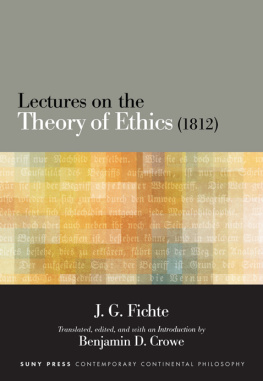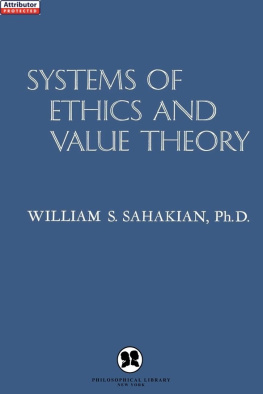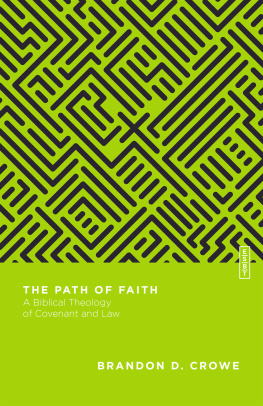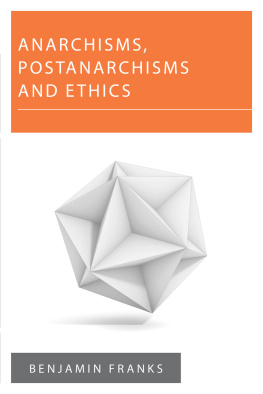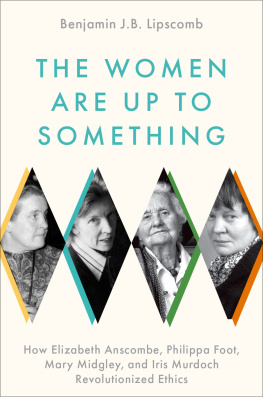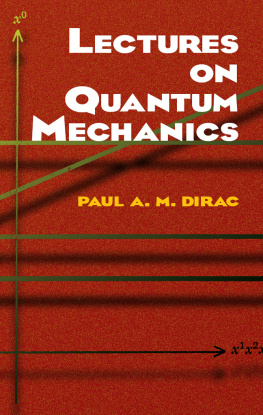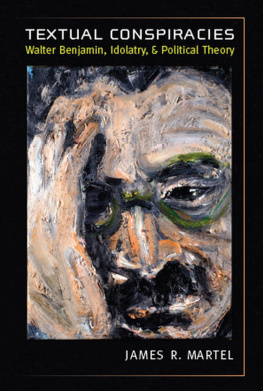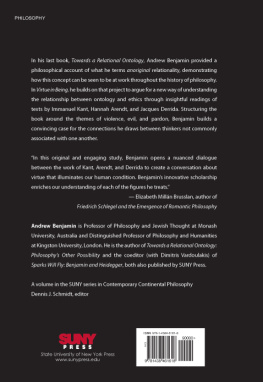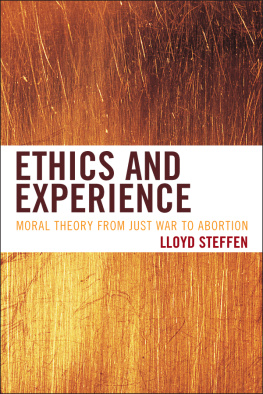Crowe Benjamin D. - Lectures on the Theory of ethics (1812)
Here you can read online Crowe Benjamin D. - Lectures on the Theory of ethics (1812) full text of the book (entire story) in english for free. Download pdf and epub, get meaning, cover and reviews about this ebook. City: New York;Albany, year: 2016;1812, publisher: State University of New York Press;SUNY Press, genre: Religion. Description of the work, (preface) as well as reviews are available. Best literature library LitArk.com created for fans of good reading and offers a wide selection of genres:
Romance novel
Science fiction
Adventure
Detective
Science
History
Home and family
Prose
Art
Politics
Computer
Non-fiction
Religion
Business
Children
Humor
Choose a favorite category and find really read worthwhile books. Enjoy immersion in the world of imagination, feel the emotions of the characters or learn something new for yourself, make an fascinating discovery.
- Book:Lectures on the Theory of ethics (1812)
- Author:
- Publisher:State University of New York Press;SUNY Press
- Genre:
- Year:2016;1812
- City:New York;Albany
- Rating:3 / 5
- Favourites:Add to favourites
- Your mark:
- 60
- 1
- 2
- 3
- 4
- 5
Lectures on the Theory of ethics (1812): summary, description and annotation
We offer to read an annotation, description, summary or preface (depends on what the author of the book "Lectures on the Theory of ethics (1812)" wrote himself). If you haven't found the necessary information about the book — write in the comments, we will try to find it.
Lectures on the Theory of ethics (1812) — read online for free the complete book (whole text) full work
Below is the text of the book, divided by pages. System saving the place of the last page read, allows you to conveniently read the book "Lectures on the Theory of ethics (1812)" online for free, without having to search again every time where you left off. Put a bookmark, and you can go to the page where you finished reading at any time.
Font size:
Interval:
Bookmark:

Theory of Ethics (1812)
SUNY series in Contemporary Continental Philosophy
Dennis J. Schmidt, editor
J. G. Fichte
Translated, edited, and with an introduction by
Benjamin D. Crowe

Published by State University of New York Press, Albany
2015 State University of New York
All rights reserved
Printed in the United States of America
No part of this book may be used or reproduced in any manner whatsoever without written permission. No part of this book may be stored in a retrieval system or transmitted in any form or by any means including electronic, electrostatic, magnetic tape, mechanical, photocopying, recording, or otherwise without the prior permission in writing of the publisher.
For information, contact State University of New York Press, Albany, NY
www.sunypress.edu
Production, Eileen Nizer
Marketing, Michael Campochiaro
Library of Congress Cataloging-in-Publication Data
Fichte, Johann Gottlieb, 17621814.
[Lectures. Selections. English]
Lectures on the theory of ethics (1812) / J.G. Fichte ; translated, edited, and with an introduction by Benjamin D. Crowe.
pages cm. (SUNY series in contemporary continental philosophy)
Includes bibliographical references and index.
ISBN 978-1-4384-5869-4 (hardcover : alk. paper)
ISBN 978-1-4384-5871-7 (e-book)
1. Ethics. I. Crowe, Benjamin D., 1976 translator, editor, writer of introduction. II. Title.
B2808 2015
| 170dc23 | 2014049310 |
10 9 8 7 6 5 4 3 2 1
Contents
Editors Introduction
In recent decades the work of J. G. Fichte (17621814) has received sustained, serious, and sympathetic consideration. In the Anglophone world, this development has been fueled, in part, by new and authoritative translations of all of Fichtes important works from what is arguably the most influential period in his tumultuous intellectual career (17931800). The situation is, however, somewhat different with respect to the period of Fichtes career that began with his move to Berlin and ended with his untimely death in 1814. Some of his later, more popular writings were translated in the nineteenth century, though these editions do not reflect the decades of serious textual work that have gone into the creation of the authoritative critical edition of Fichtes writings by an editorial team at the Bavarian Academy of Sciences. Fortunately, three of his works from the period after his departure from Jena in 1799 have recently been translated: (1) The Closed Commercial State (1801), an enigmatic treatise on political economy; (2) one series of lectures given in Berlin in 1804 on the Wissenschaftslehre ; and (3) his epochal Addresses to the German Nation of 1808. Yet, it remains largely the case that Fichtes thought after 1800 is terra incognita to English speakers. The principal goal of the present translation is to begin to change this situation by providing an English edition of one of the most important pieces from Fichtes later years in Berlin, his lectures on the theory of ethics ( Sittenlehre ) delivered in the historically momentous year of 1812.
Why this text in particular? After all, there are other important works from this period, such as lectures on the core principles of the Wissenschaftslehre delivered in 1810, 1811, and 1812, that furnish a crucial window into this stage of Fichtes career and thus into a key phase of the development of German Idealism more generally. There are several reasons for the selection of the 1812 lectures on the theory of ethics. For one, as is discussed in more detail later, Fichte always regarded the development of practical philosophy (including ethics) as one of the key motivations of his entire philosophical endeavor. Moreover, his lectures on ethics address issues of serious philosophical import that are still alive in the present, including the nature of the will and of action, moral education, philosophy of history, and religion. Further, as his train of thought progresses through the lectures, Fichte takes time to engage with some of his contemporary rivals (e.g., Schelling). The lectures are, therefore, an important source for the way significant ideas were treated during this phase in the development of German Idealism.
Another reason is that, as mentioned previously, Fichtes Addresses to the German Nation are available in English, and scholars are beginning to reassess Fichtes place in the history of moral and political philosophy in light of this text. The 1812 lectures on ethics provide philosophical depth to many of the most prominent ideas in the Addresses , which, given the nature of the latter as a public speech, do not receive the same level of argumentative grounding as they do in the lecture course. To take one example, the lectures include a discussion of universal love or benevolence as the core of the moral point of view that forces one to carefully consider the nature of the messianic nationalism expressed in the Addresses .
In what follows, I introduce the lectures on the theory of ethics by contextualizing them, both historically and within Fichtes own system. I then provide an overview or outline of the content of the lectures themselves. To begin with, I describe the way in which the lectures can be profitably read against the background of the foundation of the new, reform-oriented University of Berlin. Fichtes vision of a reformed institution of higher learning influenced many of the key players in this momentous event, and the significance of the 1812 lectures emerges most clearly in light of his ongoing commitment to this vision. Next, I briefly review Fichtes other work in moral philosophy, as well as the overall place of ethics in his philosophical system. Having thus set forth the historical, institutional, and systematic background to the lectures, I conclude the main portion of my introductory comments with an outline of the lectures themselves. The outline is not meant to provide an exhaustive analysis of the content of the lectures. Instead, my hope is that this translation will spur others to undertake just such an analysis. What the outline is meant to accomplish is more modest, namely, the furnishing of a kind of orientation or road map that brings into focus some of the main ideas and argumentative transitions that belong to Fichtes train of thought.
For more than a century prior to Fichtes delivery of the lecture course on ethics in 1812, pressure had mounted within German academic and This reformist spirit had already resulted in the foundation of two new institutions at Halle (1694) and at Gttingen (1737). In fact, for a few years prior to the inauguration of the new university in Berlin in 1810, the former institution had been the place where many of these new ideas were implemented. The Treaty of Tilsit (1808), however, stripped Prussia of its premier university and so brought the experiment to an end. This geopolitical setback nevertheless cleared the path forward to the opening of a new university only two years later in Berlin.
Two aspects of this reformist spirit are particularly relevant to Fichtes teaching activities in Berlin after 1810, in general, and to the present lecture course, in particular. First, there was an effort to liberate the philosophical faculty within the academy from its subordinate position in relation to the professional faculties of law, medicine, and theology. Not only was philosophy to be granted the same level of prestige and support as the other faculties, it was to become the central discipline . One of the most influential arguments in this regard was provided by Kant in The Conflict of the Faculties (1798), a series of essays in which Kant made public some reflections rooted in his own struggles for academic freedom. Fichtes erstwhile friend and ally in the post-Kantian movement, F. W. J. Schelling, offered his own defense of the primacy of philosophy in lectures delivered in Wrzburg in 1802 on the method of academic study. Finally, Friedrich Schleiermachers Occasional Thoughts on Universities in the German Sense (1808), published just prior to the actual establishment of the University of Berlin, likewise argued for the primacy of philosophy. As will become clear, Fichte shared this aspect of the reformers program, and his lectures on ethics from 1812 closely follow both his own ideas regarding the centrality of philosophy within the academy as a whole and the carefully delineated architectonic of his own system, which was partially designed to reflect his view of the special function of philosophy.
Font size:
Interval:
Bookmark:
Similar books «Lectures on the Theory of ethics (1812)»
Look at similar books to Lectures on the Theory of ethics (1812). We have selected literature similar in name and meaning in the hope of providing readers with more options to find new, interesting, not yet read works.
Discussion, reviews of the book Lectures on the Theory of ethics (1812) and just readers' own opinions. Leave your comments, write what you think about the work, its meaning or the main characters. Specify what exactly you liked and what you didn't like, and why you think so.

